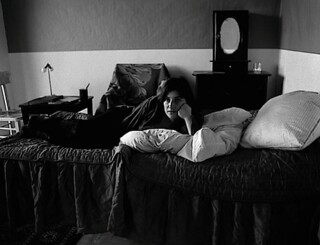On Chantal Akerman
Daniella Shreir
Chantal Akerman’s films don’t have conventional plots with a beginning, middle and end. Yet nearly all the obituaries, following her death at the age of 65 this month, described how Akerman was inspired to make her first film at the age of 18 after watching Godard’s Pierrot le Fou, and said that Gus Van Sant cited Akerman as one of his major inspirations. Over and over, we were given her genesis as a filmmaker and the promise of her reincarnation, bookended by two credible male auteurs.
Her death, too, was cast as part of the narrative. Akerman committed suicide; the obituary writers implied it had something to do with her final public appearance in mid-August, when the preview of No Home Movie was booed at the Locarno film festival. But Akerman was never dismayed by criticism; she thrived on it. During the Cannes preview of the three-and-a-half-hour Jeanne Dielman (1975), now considered a classic of feminist counter-cinema, Akerman recalled the rebounding of fold-up seats as audience members walked out, and Marguerite Duras shouting on her way to the exit that Akerman was crazy. Akerman gave as good as she got until the film’s star, Delphine Seyrig, urged her to sit down. She never lost her taste for tragicomic confrontation; at Locarno this August, her response to the booing was to say: ‘It was a great film, no?’
This self-aware sense of humour was an abiding characteristic of Akerman’s public persona. In a recent interview, she laughed as she described how some of the films she made in New York in the 1970s had been financed with money stolen from the 55th Street Playhouse, the gay porn cinema in Manhattan where she worked as a cashier. (The padding from the dollar bills kept her warm walking home, she said.) Her first film, Saute ma ville (1968), was self-financed. To secure funding from the Belgian government for Jeanne Dielman, she submitted a much shorter script with a more conventional feminist message.
Akerman always insisted that she made ‘Chantal Akerman films’ and was no porte-drapeau (standard-bearer) for a particular brand of feminism. This may sound like an abnegation of responsibility, but Akerman’s early films are as distant from the feminism of the time as they are from traditional linear cinema. She refused to give her characters a cohesive, easily recognisable identity.
In Je, tu, il, elle (1976), the main character, played by Akerman, gives a hand-job to a male truck driver and engages in a stark seven-minute lesbian sex scene that ends the film. The title character of Jeanne Dielman is both a housewife and a sex worker and, by the end, a murderer. Many of Akerman’s displays of exposed bodies could be isolated pieces of feminist performance art; in some ways, she was less like Agnès Varda than Marina Abramović. As she put it, the idea of a single language of feminist film ‘is like saying there is only one way for women to express themselves. But there should be as many different ways as there are different kinds of women making films.’
There was a pragmatic side to Akerman’s feminism. She aimed for an 80 per cent female crew, employing women in roles normally fulfilled by men (cinematographers, lighting technicians, sound recordists) so that a literal or metaphorical male gaze didn’t dictate the shots. She shot at her own eye level so that ‘the camera was not voyeuristic’: ‘You always knew where I was. You know that it wasn’t shot through a keyhole.’ And when she’s playing one of her characters, Akerman often stares directly back into the camera for an uncomfortable length of time: as relentless, confrontational and provocative on-screen as off.

Comments
Saute ma Ville in my tv program (De Andere Film) on the flemish television (BRT). Not much money, but anyway...
Then she tried to shoot l'Enfant Trouvé in the South of France...
After a stay in NY she came back with Hotel Monterey.
Again I was glad to be able to show it in my program (and Chantal was happy with the money too). Big problem: the film was totally silent. So I put... Mozart's Don Giovanni as a sound track on it.
If you want to know about these first years of her career, please look at Necs and my interview with Annie van den Oever.